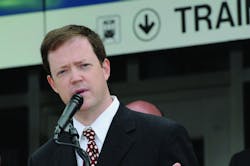Richard Davey
General Manager
Massachusetts Bay Transportation Authority
Richard Davey is an experienced rail and transit manager who most recently served as general manager at the Massachusetts Bay Commuter Railroad (MBCR), the company which operates and maintains the Massachusetts Bay Transportation Authority’s commuter rail service, the fifth largest service in the United States. Davey took over as general manager of MBTA in April 2010. He has focused on five key priorities (safety, customer service, innovation, employee relations and fiscal responsibility). With these priorities as a foundation, Davey is rebuilding the MBTA’s credibility with the public and within the industry and working hard to create a foundation for long-term investment.
He created a Safety Statement to inform the public that safety is a core value of the Authority and an integral part of each employee's job. He is re-establishing an alliance with OSHA to promote safe and healthy working conditions and provide safety training and education programs. Additionally, he formed safety committees to identify safety and health hazards in the workplace, make recommendations and take action to reduce and/or eliminate unsafe conditions. He overhauled the Safety Department to become more responsive for reinforcing the importance of a safety culture at the MBTA. Further, he mandates that Authority meetings start with a “Safety Briefing.”
While at MBCR, Davey implemented new customer outreach and information programs, increased work force diversity and implemented a companywide diversity and harassment training program. Due to Davey’s focus on operations, safety and customer service, on-time performance rates improved while customer complaints dropped 40 percent in 2009 from 2008.
Davey understands that the Authority is doing more with less. He has taken steps to have each department reduce its FY11 budget by a goal of 2 percent for a saving of $24.3 million. Furthermore, he is working to insulate the operations budget from the potential harmful impact of unpredictable and volatile fuel prices by hedging the price of the 18 million gallons of diesel fuel required to provide bus and commuter rail service each year.
Lastly, Davey has taken an innovative approach to improving the customer experience in cost effective ways. He directed his staff to release at no charge real-time bus location and countdown data to software developers to answer the age-old questions, “Where’s the bus and where’s the train?” With this data, third-party software developers created smart phone/computer applications at no cost to the MBTA. Using the same model, he is working with developers to build an application that will allow customers to upload images of issues/concerns they see while riding the system and send it to the customer service department for action.
“I just came from Hong Kong and Seoul; there were construction cranes everywhere. Transportation, one of America’s most advantageous economic assets in the 20th century, is now falling behind. And yet, the No. 1 concern I hear from customers is that they want more service. We can’t add more service without funds. Something’s got to give.”
“As I like to say, GMs come and go but the trains and buses always run. That’s because I’m fortunate to work with 6,000 hardworking men and women at the T and I’m proud to be their GM.”
